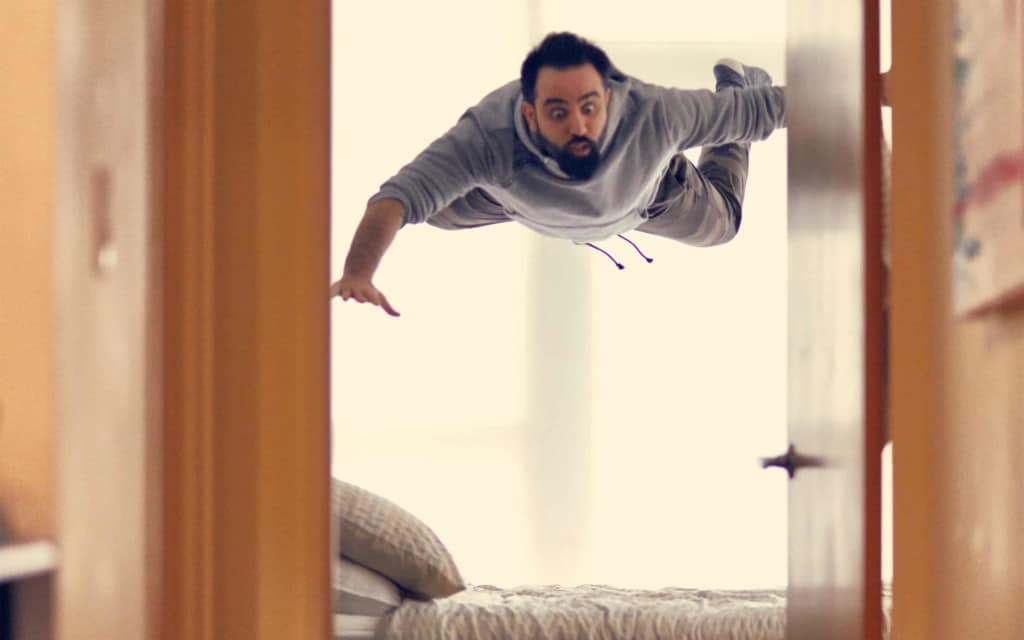Nightmares are the worst.
These dreams are bad enough to rip you out of your slumber. They’ll leave you covered in sweat, terrified by the haunting image of a pack of hungry sandwiches chasing you around your old school.
While some nightmares seem to be incredibly personal and intimate, the truth is that many of experience the most common nightmares time and time again — albeit in different ways.
Like any dream, your nightmares are how your brain processes information and addresses challenges that you may be facing in your life. That means that most of us encounter the same themes of being trapped, being chased, or even overcoming issues with our self-esteem.
The good news?
While nightmares might not be a lot of fun, they can be very telling.
Psychologists believe that nightmare interpretations can offer an insight into the subconscious mind — helping us to understand what may be holding us back in our conscious lives.
If you can successfully answer the question: “What does my nightmare mean?” you may also be able to figure out how to improve your confidence and overcome fears in your day-to-day life.
Scientists continue to discover links between our dreams and conscious thoughts. Therapists, and dream experts are beginning to offer insights into the different types of nightmares most adults face.
Here’s your guide to the most common nightmares and their meaning.
Are adult nightmares common?
Nightmares are more likely to happen with children than with adults.
That may be because children have far more active imaginations than adults do. It may also be because the brain of a child is continually trying to make sense of the world around it, and dreams can help with this.
However, just because nightmares aren’t as likely with adults, doesn’t mean they don’t happen. Around 50% of adults have disruptive dreams occasionally, according to psychological studies. Women have these dreams more than men.
Experts believe that nightmares are a cry for a solution to a threat or concern that we face in our conscious lives. For instance, a child going through puberty might have recurring nightmares that are related to their self-image and future.
Importantly, while a nightmare is a bad dream – not all bad dreams are necessarily nightmares. Before you start the arduous process of nightmare interpretation, make sure you’re not just having a bad dream.
Nightmares happen during the deepest and final stage of sleep — REM. This is when the brain and spinal cortex stop communicating, which means that your limbs are often temporarily paralysed.
When you have a nightmare during REM sleep, the dream pulls you back into consciousness rapidly. Often this leaves you sweaty, out of breath, and frightened. On the other hand, if you just have a bad dream, you may not wake up at all.
Although nightmares are less frequent among adults than children, it’s worth noting that some adults are more likely to have bad dreams.
Studies into our sleeping habits suggest that adults who are “creative” are more likely to experience vivid and complex dreams. Their brains are attempting to make sense of the world around them.
A study conducted in 2015 also found that adults who deal with problems like depression and exhaustion are prone to nightmares too.
An additional study in 2009 found a link between anxiety and an increased risk of nightmares for women. This report also indicated that it’s more common for women to suffer from nightmares than men.

What do common nightmares mean?
Only a very small percentage of adults (around 1%) have nightmares that are so severe and frequent that they need to seek professional guidance from a doctor.
That doesn’t necessarily mean that you should just ignore your bad dreams, however. Even a single nightmare every once in a while, can cause significant problems with your sleeping patterns.
Nightmares disrupt your REM sleep, which means that you struggle to get a full night of rest. Additionally, when bad dreams happen regularly, they can cause a state of anxiety that makes it difficult to get to sleep each night.
Since sleep is the time when your body and mind needs to relax, reboot, and recover for the next day, frequent nightmares can be highly disruptive.
In the long-term, your energy and mental health could deplete to the point where you’re more likely to suffer from issues like depression, stress, and even high blood pressure.
So, how do you get control over common nightmares in adults?
The easiest option is to find out what’s causing your bad dreams to begin with.
According to clinical psychologist John Mayer, the human brain works like a computer. In other words, the data that goes in through the day determines what’s going to come out when you’re sleeping.
If you go to bed with negative thoughts, or you’ve been dealing with negative issues all day, then your brain is going to recycle those issues while you’re sleeping.
One study from Finland found that people with a negative self-attitude were significantly more likely to have nightmares. Even standard feelings of stress in your everyday life can have an impact on your dreams and sleep quality.
Common but stressful experiences, like changing roles at work, can cause a nightmare. You might be moving to a new house, or dealing with an upcoming test, and your brain responds with a nightmare.
Nightmare interpretations: Common bad dreams
Though nightmares can come from a wide variety of triggers, one of the most common contributors to your nightmares is your daytime thoughts. Other triggers can range from the foods you’ve eaten to your sleep hygiene strategy.
If you can decode what your dreams are telling you, then you may be able to take steps to overcome them in your conscious time.
Though the precise subjects of nightmares often vary from person-to-person, there are common themes that tend to occur with virtually all adults. With that in mind, here’s your guide to the most common nightmares and what they mean.
1. Your teeth are falling out
One of the most common nightmares of all has to do with your teeth suddenly falling out of your mouth. You might see yourself in a mirror with nothing but gums.
Maybe you’re just continually picking one tooth after another off the floor around you, when you’re wandering through your dreamscape.
Unsurprisingly, this dream has a lot to do with your self-esteem and how you look.
Many professional nightmare interpretations suggest that dreams about your teeth indicate that you have problems with your own image.
Other people suggest that dreams about teeth could indicate a loss of power. Since we use our teeth to eat and rely on them every day, losing your teeth could mean that you’re worried about becoming powerless.
2. You’re being chased
Dreams about being chased are another of the most common nightmares for adults. You may be pursued by something logical, like a murderer, or a pack of rabid wolves.
Or you might be chased by something more ridiculous like a group of hamburgers, or the documents you didn’t finish at work that day. Either way — the experience is incredibly frightening.
According to psychologists and dream specialists, a chasing nightmare usually links back to the goals that you’re pursuing in your life. It links to your concern about not moving fast enough towards them.
Perhaps looking at new ways to make progress in your conscious life would help?

3. You’re falling
When it comes to the most common nightmares, dreams about falling top the list, according to a survey conducted in 2016.
Usually, when you have these dreams, you wake up with a jolt, feeling as though you’ve just hit the bed from some imperceivable height.
Most people assume that dreams about falling have something to do with our nervous system. When you begin to relax at night, and your muscles shut down, it can feel like you’re falling. Although, you’re usually unconscious so you don’t notice it.
Dreams about falling can indicate you’re worried about a lack of security or control.
4. You’re naked in a public place
This is another nightmare that will be familiar with many of our readers. It’s so common that it’s even been recreated in pop fiction, via countless TV shows and movies.
You might be giving a speech to a crowded room, or standing in front of your class at school, and you suddenly look down to realise that you’re completely naked.
If you’re imagining being naked in an inappropriate place, the chances are that you’re feeling vulnerable about something in your life.
Your nightmare may also have something to do with your deep-seated insecurities. For instance, you might feel like you don’t belong at work, or you feel like an outsider at school.

5. You’re late or unprepared for something
Have you ever had a dream where you’ve turned up to school and discovered you have an exam that you haven’t studied for? Maybe you go to work and learn you suddenly need to give a presentation that you’re just not ready to give?
You might even be running late for work or struggling to meet a deadline, because you haven’t managed your time correctly.
Dreams like this indicate that you’re feeling overwhelmed in your day-to-day life.
You might feel as though you can’t get a handle on all the things that you need to do in your life. This means that you always feel like you’re rushing around, under-prepared.
6. You or someone you care about is dying
While all nightmares are frightening, this one can be as upsetting as it is terrifying. Dreaming about death is one of the most common nightmares in adults. This dream particularly happens during a time in your life when you’re facing your mortality.
For instance, if you’re getting older with an upcoming birthday, you’re more likely to dream about death. Or maybe you’ve recently had a loss in your family or friendship circle.
Sometimes, dreams about death can also indicate that a specific phase in your life is coming to an end. For example, you could be overcoming a habit or leaving an old job behind.
Even if the thing that you’re leaving behind is negative, like a smoking or drinking habit, a nightmare can be your way of dealing with the worries you have about the change.

7. You’re trapped
Dreams about being trapped are particularly nerve-wracking for people with claustrophobic tendencies. In these scenarios, you might be trapped in a room without any windows or doors, or you could be stuck in a car that’s about to crash.
Although being trapped is one of the most common nightmares for adults, it’s also one of the easiest to interpret.
If you’re worried about being trapped in your dreams, you probably feel restricted by something in your life.
You might be stuck in a job that you hate, or a relationship that you’re not happy in anymore. The easiest way to overcome this issue, is to find the thing that’s trapping you and break free.
8. You’re lost
Just like nightmares about being trapped, dreams where you’re lost in an unfamiliar place are relatively easy to interpret.
They generally suggest that you’re feeling a little lost in your real life.
For instance, maybe you’re not sure what path to take with your career? You might not know what you should do next with a problem in your relationship or your personal life.
Nightmares about being lost can be very upsetting, but they’re also an opportunity. You can explore your options and think about what you might want to do to. You might find your way back to wherever you want to be.
9. You’ve been betrayed
As we grow up and get into serious relationships, nightmares about our connections with other people become increasingly common.
One of the most common nightmares for someone in a partnership, is that their partner is cheating on them.
If you have a dream like this, don’t rush to any hasty conclusions that your lover can’t be trusted. Most sleep specialists believe that dreams about infidelity indicate that you’re worried you’re not spending enough time with your loved ones.
A dream about a betrayal may also be a sign that you’re feeling self-conscious. You might be worrying that you don’t deserve your partner for some reason.
When you’re not dating anyone and you could have a dream about a cheating partner anyway. This may indicate that you’re concerned, you’ll never find someone you can trust.

10. You’re drowning or suffocating
This is another dream that lends itself easily to nightmare interpretations. Oceans in the dream world often represent emotion.
That means that if you’re drowning, or you’re surrounded by water, you probably feel overwhelmed by all the feelings that you’re trying to hold in.
You may feel overworked, you could be dealing with grief, or you might have a lot of stress to handle right now.
In some cases, a dream that you’re drowning, or suffocating may also be a sign that you’re having real problems with your breathing while you’re asleep.
If you regularly have these kinds of nightmares and experience a lot of hypnic jerks (muscle spasms) or snore very loudly, you could be at risk of sleep apnea.
11. You’ve been injured
Life-threatening attacks aren’t the only thing that you might worry about when you’re asleep. It’s very common for adults to dream about being hurt or attacked in some way.
You might just suffer a few bumps and bruises in your dream, or you might be part of a serious accident that leaves you covered in bandages.
When people have a nightmare that involves getting injured or wounded, this usually indicates that you have some feeling of personal weakness. You’re maybe dealing with this aspect of your life right now.
Dreaming about breaking bones, cuts, or bruises could be your brains way of alerting you to how vulnerable you feel in certain parts of your life.
What is the most common nightmare?
Nobody enjoys nightmares.
However, the chances are that throughout your life, you’ll experience at least one of these horrible dreams.
It could occur when you’re a child, or it might happen during a stressful time in your life as an adult.
At the moment, there’s still a lot of research ongoing into the area of nightmares, and why we dream the way that we do.
Experts are yet to fully understand why nightmares happen to us at all.
However, we do know a little about the kind of dreams that people are more likely to experience. For instance, the Amerisleep company conducted a study into 2,000 people, to find out the answer to “what is the most common nightmare of all?”
The research found that a lot of people share similar nightmares, often about things like being chased, or dealing with a problem in their relationship.
However, 65% of the respondents said that “falling” was the most common fear in their nightmares. This could be down to the fact that when your body and muscles relax during sleep, your mind may accidentally interpret the experience as falling.
Although, we’re not sure if this is theory is 100% correct.
Alongside falling, some of the other common types of nightmares included:
- You’re being chased — 63%
- Dreams about death — 55%
- You’re getting lost — 54%
- Dreams about feeling trapped — 52%
- Dreams about being attacked or injured — 50%

Dealing with the most common nightmares
The most common nightmares for adults often happen spontaneously and without warning. Doctors and experts are beginning to explore the triggers that may make nightmares more common.
For instance, some people are more likely to suffer from bad dreams after they’ve had a late-night snack, as this boosts the metabolism and increases brain function.
Medications can also increase your risk of having nightmares by altering the chemical balance within your brain and body.
Some people even suffer from nightmares when they’re experiencing feelings of withdrawal. They’ve stopped taking medications, or they’re cutting down on alcohol.
Even sleep deprivation can increase your risk, as you’re more likely to be emotional and irrational when you’re exhausted.
For most people, the key to overcoming various types of nightmares, is understanding why you have bad dreams. What do you need to alter in your conscious life?
Sometimes, the cause of your nightmares will be a physical issue, like sleep apnea or restless leg syndrome. Other times, it could be a significant mental disorder like PTSD, depression, or anxiety.
More often than not bad dreams are caused by the experiences that we have in our everyday lives. The more overwhelmed and stressed you feel at work, the more likely you are to have nightmares about being trapped in your office.
The more nervous you feel about the way that you look, the higher your chance of having a dream about your appearance will be.
Like any dream, a nightmare is your brain’s way of making sense of your thoughts and feelings throughout the day. If you want to overcome your nightmares, find out what’s causing your emotions to run rampant, and take steps to make a change.
Want more advice on handling your nightmares? Remember to subscribe to siestio.com for regular insights, articles, and reviews into the world of sleep.
Siestio. Sleep Matters.
General advice disclaimer
This article contains general tips and advice. However, no diet or exercise program should be started without consulting your physician or other industry professional first. For more information read our full disclaimer here.







